Lost in Translation
Naija Wife's Kitchen high on good vibes, light on memorable flavors
The 2025 James Beard Foundation Awarrds were named last month, and among the semifinalists for Best Chet: Southwest was Tahnee Francis, whose Nigerian concept Naija Wife’s Kitchen, is making waves from its home in the Robinson Renaissance Building food court. Francis Oklahoma City nominees Kevin Lee of Birdies, Olivier Bourzerand of Fait Maison, Zack Walters of Sedalia’s Oyster & Seafood, and Eric Smith of The Crown.
Francis’s menu is highlighted by Nigerian staples like Egusi Soup, Jollof Rice, Efo Riro, Fried Fish Steak, and Fufu, bringing the bold and vibrant flavors of West Africa to Oklahoma City.
Beyond her culinary talents, Tahnee is a community ambassador, using her social media platforms to celebrate diversity and advocate for inclusivity. In 2022, she was crowned Miss Black Oklahoma International Ambassador, where she became a voice for individuals with disabilities across the state. Her James Beard nomination not only honors her culinary achievements but also recognizes her impact on Oklahoma’s cultural and gastronomic landscape.
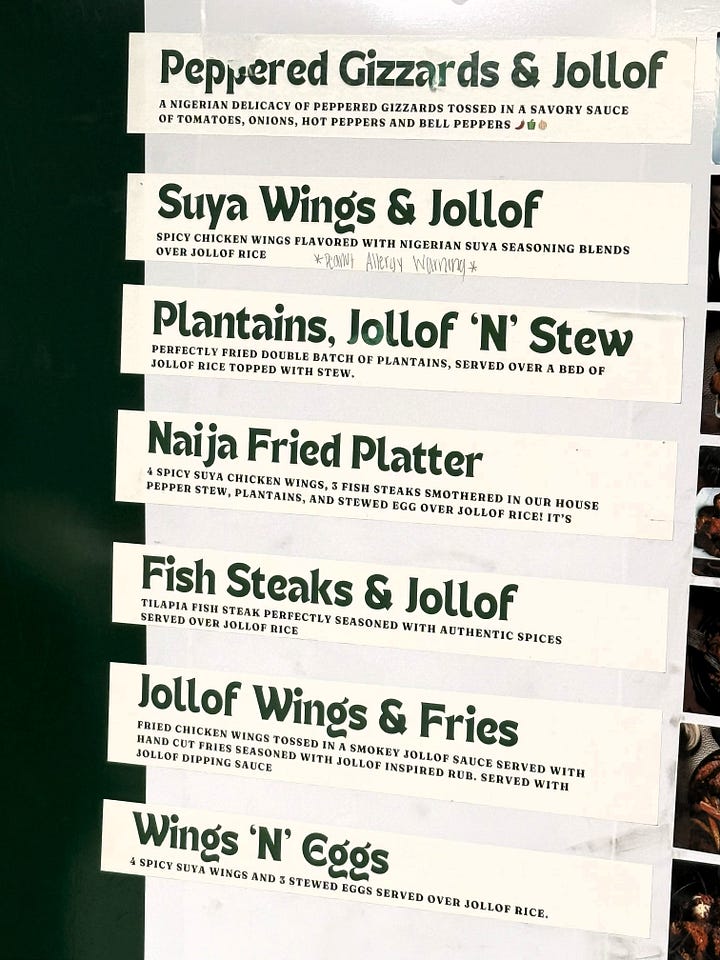
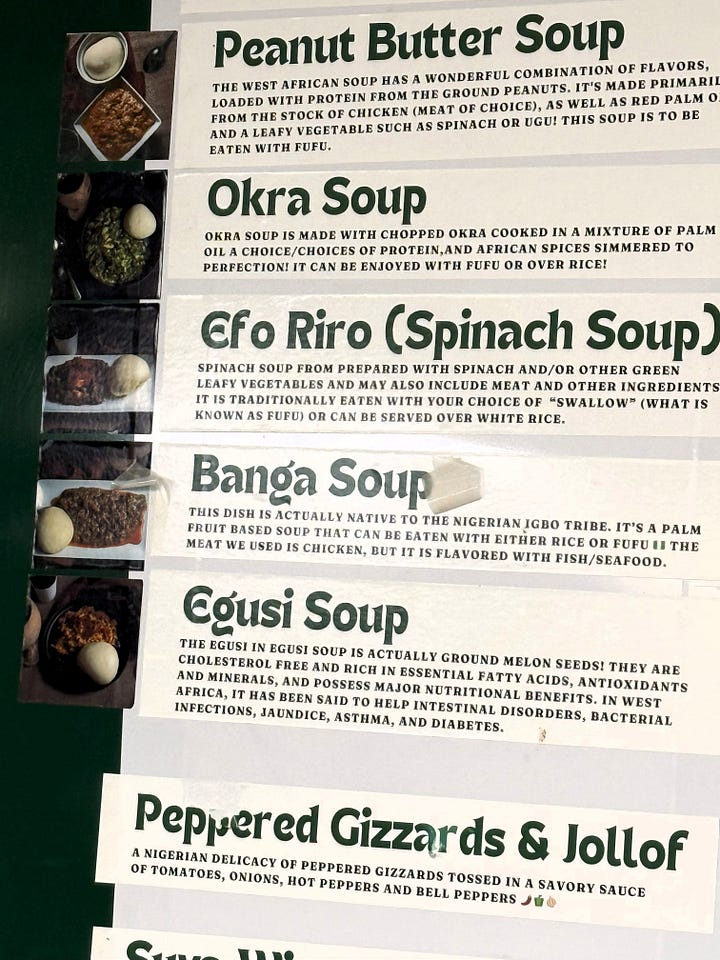
Naija Wife’s Kitchen was not my first experience with African cuisine. My introduction dates back to 2009 when I first tried Ethiopian dishes at Haiget’s in Edmond. More recently, in 2023 and 2024, I explored Nigerian flavors at Lyanze and Nigerian Kitchen in Chicago. The bold, earthy richness of egusi, the smoky depth of fish, and the fiery heat of scotch bonnets left a lasting impression — Nigerian food is a celebration of humble, deeply flavorful dishes. With glowing reviews floating around social media and a new James Beard nod, expectations were high for Naija Wife’s Kitchen. Tahnee’s success marks an important milestone for Oklahoma’s evolving culinary scene, showcasing the state’s growing diversity and innovation. Let’s eat.
Dining
Naija Fried platter with suya chicken wings, fish steaks in pepper stew, plantains, stewed egg over Jollof rice.
The platter lacked depth of flavor, with each component becoming monotonous after a few bites. The suya chicken wings had a lovely crisp exterior and featured a lightly seasoned flavor profile, highlighting paprika and garlic with a subtle sweetness at the back end. The fried plantains had a soft texture, were underseasoned, and bland. The Jollof rice carried mild notes of paprika and mild spices, but was on the dry side. The tilapia fish steak had a beautifully crispy exterior and a light fish flavor profile, but the accompanying red pepper stew on top tasted primarily like cooked pepper, with no real depth of flavor. Overall, the platter felt one-dimensional, with a lack of layered flavors and varied textures.
Peanut Butter Soup, Okra Soup, Efo Riro Soup, Banga Soup, and Egusi Soup
Please note: many of the soups use “palm oil” or “palm nuts”, which is a staple in West African cooking.


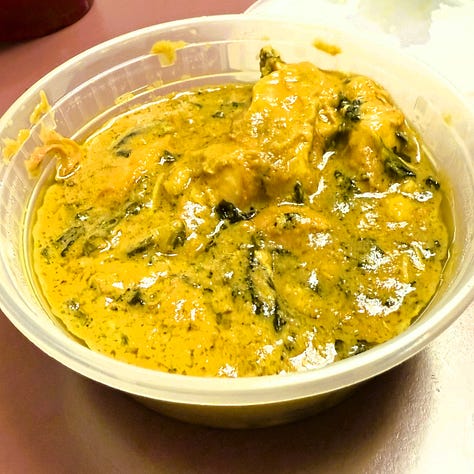
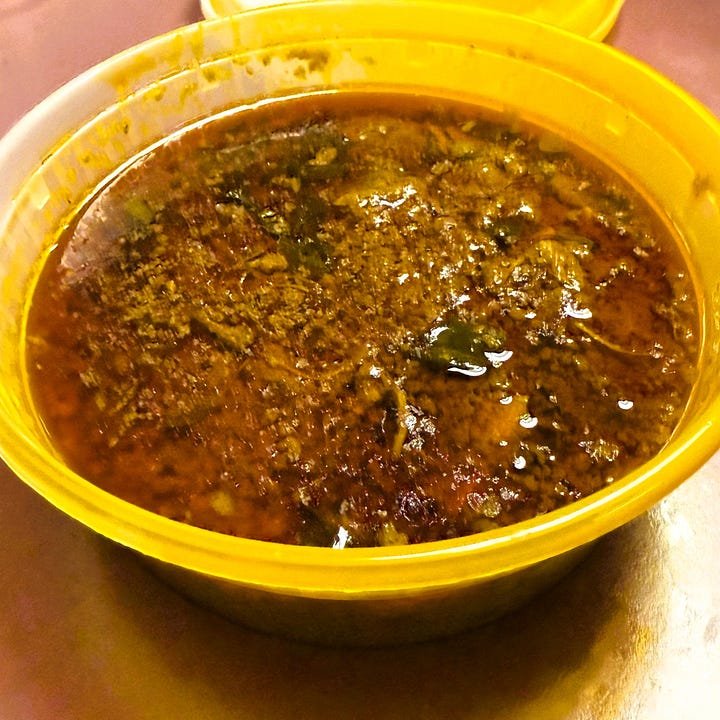
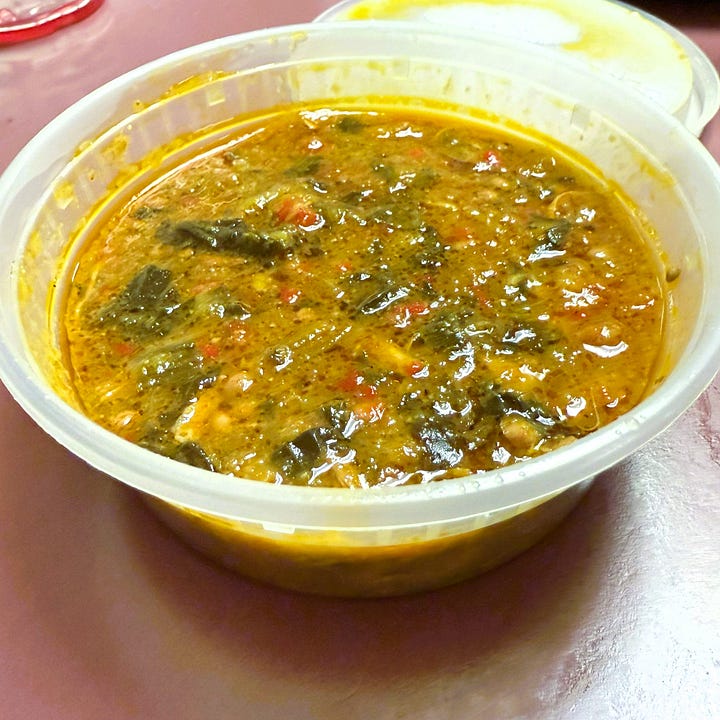
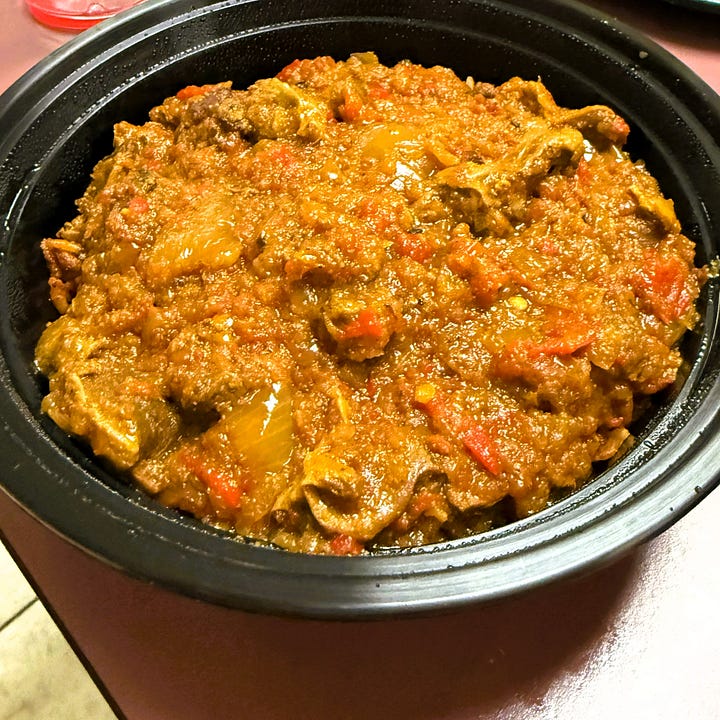

The Friday special featured a soup sampler, served with fufu, a starchy ball of kneaded yam used for dipping. Thef fufu has a neutral flavor profile with a soft, slightly gummy texture. Each soup was sampled individually and dipped with the fufu. Almost all the soups had a considerable amount of palm oil that pooled at the top, making them unappealing and heavy.
The peanut soup boasts a flavor profile dominated by peanut and chicken, with little variation in between. It had a slightly sweet and salty taste that was pleasant. The texture was thick and gelatinous. The addition of the fufu amplified the chewy, gelatinous texture, but it helped cut through the heaviness of the soup.
The okra soup features a milder flavor of fresh okra and vegetables. Its texture was rustic and provided a pleasant mouthfeel. While it also had a lot of oil, it worked more harmoniously with the fufu than some of the other soups.
The Banga soup had some savory notes, but lacked seasoning and depth of flavor. After a few bites, the flavors became one-dimensional. The Efo Riro soup was refreshing and crisp with notes of spinach, tomatoes, and pepper. Overall, it had a pleasant flavor profile. The Egusi soup offered the greatest contrast in texture, with its nutty, rich, umami flavor profile. It was a good representation of the West African classic. The final sampling was the goat. It was fork tender, heavy with oil, and under seasoned.
Overall, much like the fried platter, the soups lacked the bold, rich flavor commonly associated with African cuisine. It’s not the heat level being critiqued, but the balance, intensity, dynamics, and richness that each dish was missing.
Final Thoughts
Tahnee’s dedication to her craft and her commitment to bringing something special to Oklahoma are undeniable. She is a true ambassador of West African cuisine. However, passion alone does not always translate into exceptional food. At Naija Wife Kitchen, muted flavors, textural inconsistencies, and uneven preparation were noticeable across multiple dishes. While the spirit of authenticity and warmth is deeply embedded in the dining experience, the execution did not consistently meet the level of excellence expected.
When I think of a James Beard nomination for “Best Chef,” I think of the foundation’s mission — one that not only recognizes culinary excellence but also champions commitment to community, sustainability, and cultural representation. Tahnee unquestionably embodies the latter part of the mission statement. This review, however, focuses on the food and culinary excellence as it was presented. I sincerely hope to see her continue refining her craft and sharing her passion with the world.
Final Score: 27/60
Note about the ratings: Scores are out of 60 with a standard deviations of +/- 10 points.
56-60: pièce de résistance
50-55: Excellent
40-50: Above Average
20-40: Average
11-20: Below Average
0-10: Low





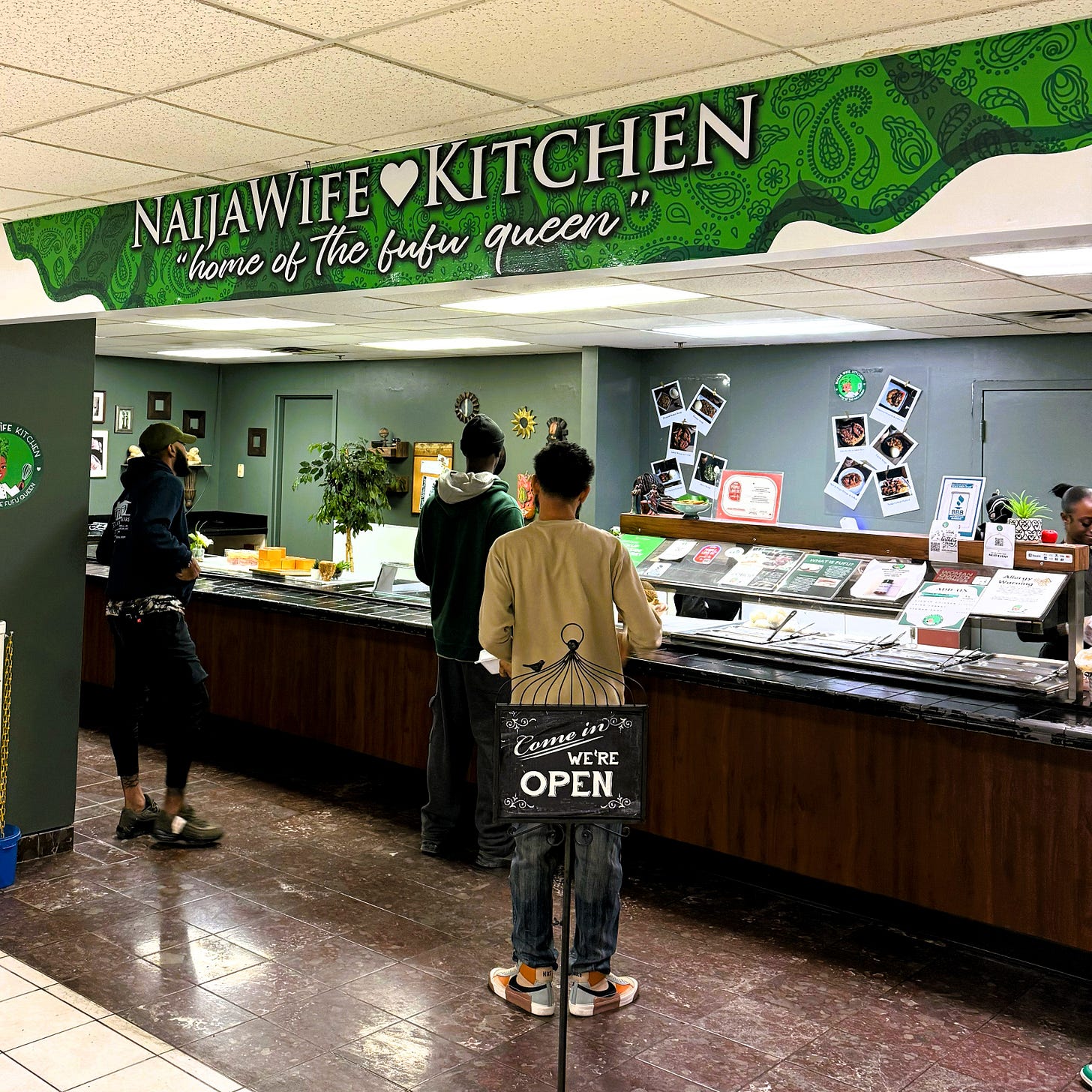

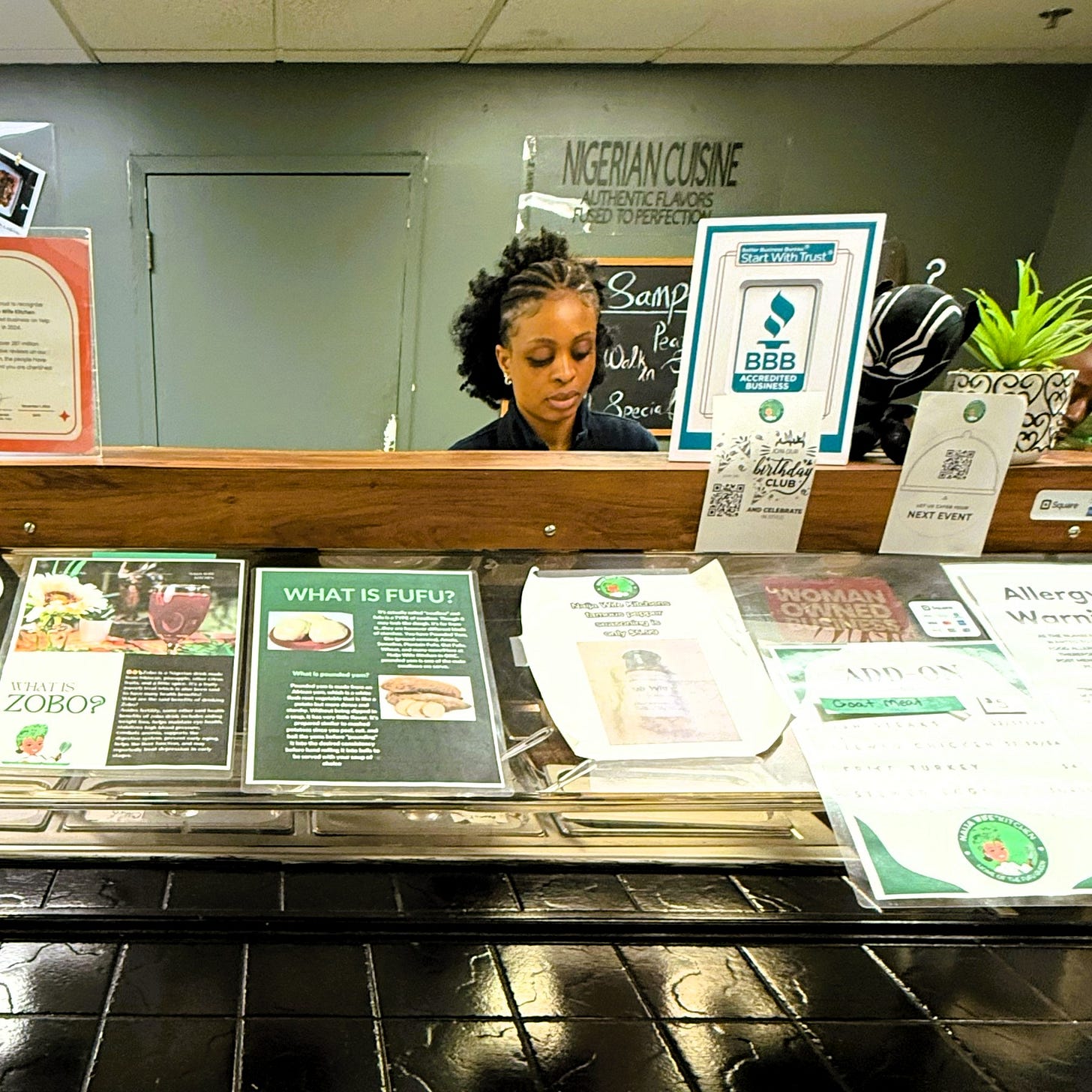

Thank you for the helpful and balanced review. I like this format. I follow you and I enjoy your content, but this review was particularly pointed. I liked the systematic organization. The rating scale was really useful. I would love to see more like this.